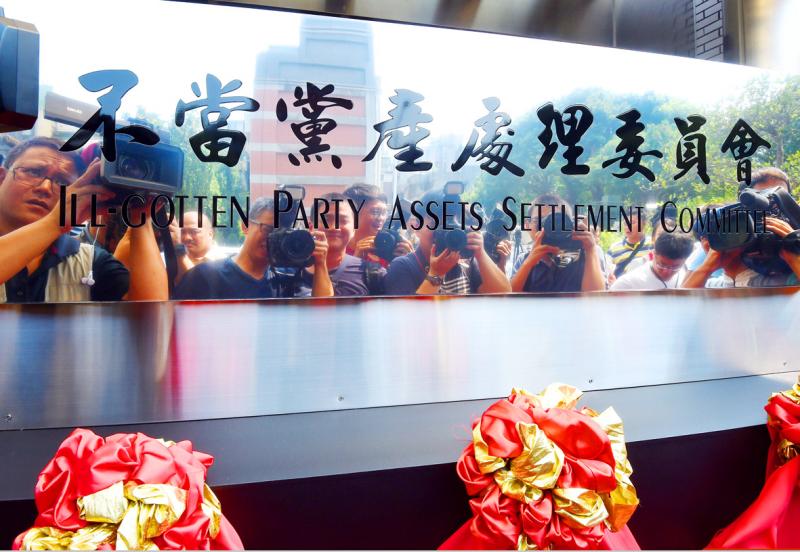The Council of Grand Justices yesterday ruled that provisions of the Act Governing the Settlement of Ill-gotten Properties by Political Parties and Their Affiliate Organizations (政黨及其附隨組織不當取得財產處理條例) are constitutional.
In Constitutional Interpretation No. 793, the grand justices upheld major areas of contention in the act, which were the basis of a constitutional challenge by seven Taipei High Administrative Court judges in May, after the Chinese Nationalist Party (KMT) in 2016 brought a case questioning the act’s legality.
The interpretation addressed questions that the act might have hindered constitutional protections for citizens to organize political parties.

Photo: Liu Hsin-de, Taipei Times
“Provisions in the act on the settlement and transfer of ill-gotten assets do not infringe upon the dissolution of political parties, which is unconstitutional, and they do not deprive political parties of those assets which they depend on for their continual operation,” the interpretation said.
The grand justices also said there was no breach of the Constitution in establishing the Ill-gotten Party Assets Settlement Committee, and the committee’s authority did not contravene the “division of government power” under the Constitution.
The interpretation also ruled that the act does not contravene Article 7 of the Constitution, which provides all citizens equality, despite their political affiliation, nor does it breach the principles of “legal certainty” and “equality and proportionality.”
The interpretation cited Article 4 of the act which states that the settlement of ill-gotten assets is focused on those acquired by political parties without paying a fair price.
“Before the lifting of Martial Law and the end of wartime mobilization to suppress a communist rebellion, the KMT used its dominance as the ruling party to obtain properties from the nation and its people. The KMT did so in ways which appeared in form as legal, but the actual process contravened the law and order of a constitutional democracy,” Judicial Yuan Secretary-General Lin Hui-huang (林輝煌) said in a statement yesterday. “Therefore, corrective measures should be taken to build an environment for fair competition among all political parties, and to ensure ‘constitutional order of liberal democracy.’”
“For our democracy, under the rule of law with a plurality of political parties, it is essential to have fair and equal competition among all political parties, and therefore some appropriate measures are needed to regulate the finances of political parties,” Lin said.
The committee said that the interpretation “is an important decision in establishing a firm foundation for the nation’s efforts to achieve transitional justice and to handle properties and assets obtained through illegal means by political parties.”
The KMT said the Council of Grand Justices is no longer an independent and neutral organization.
“The KMT is not surprised that the grand justices, who have been approved by the Democratic Progressive Party [DPP], would reach such a constitutional interpretation,” it said in a statement, adding that the council has become an affiliate organization of the DPP.
KMT Culture and Communications Committee chairwoman Alicia Wang (王育敏) added that members of the Ill-gotten Party Assets Settlement Committee have certain political leanings.
The members have undermined the judiciary and have decided that the KMT has obtained assets illegally, which only serves to highlight how the independence of the judiciary and, in general, the rule of law, is being eroded, she said.
Additional reporting by Shih Hsiao-kuang

The Central Election Commission has amended election and recall regulations to require elected office candidates to provide proof that they have no Chinese citizenship, a Cabinet report said. The commission on Oct. 29 last year revised the Measures for the Permission of Family-based Residence, Long-term Residence and Settlement of People from the Mainland Area in the Taiwan Area (大陸地區人民在台灣地區依親居留長期居留或定居許可辦法), the Executive Yuan said in a report it submitted to the legislature for review. The revision requires Chinese citizens applying for permanent residency to submit notarial documents showing that they have lost their Chinese household record and have renounced — or have never

A magnitude 5.6 earthquake struck off the coast of Yilan County at 12:37pm today, with clear shaking felt across much of northern Taiwan. There were no immediate reports of damage. The epicenter of the quake was 16.9km east-southeast of Yilan County Hall offshore at a depth of 66.8km, Central Weather Administration (CWA) data showed. The maximum intensity registered at a 4 in Yilan County’s Nanao Township (南澳) on Taiwan’s seven-tier scale. Other parts of Yilan, as well as certain areas of Hualien County, Taipei, New Taipei City, Taoyuan, Hsinchu County, Taichung and Miaoli County, recorded intensities of 3. Residents of Yilan County and Taipei received

Taiwan has secured another breakthrough in fruit exports, with jujubes, dragon fruit and lychees approved for shipment to the EU, the Ministry of Agriculture said yesterday. The Animal and Plant Health Inspection Agency on Thursday received formal notification of the approval from the EU, the ministry said, adding that the decision was expected to expand Taiwanese fruit producers’ access to high-end European markets. Taiwan exported 126 tonnes of lychees last year, valued at US$1.48 million, with Japan accounting for 102 tonnes. Other export destinations included New Zealand, Hong Kong, the US and Australia, ministry data showed. Jujube exports totaled 103 tonnes, valued at

BIG SPENDERS: Foreign investors bought the most Taiwan equities since 2005, signaling confidence that an AI boom would continue to benefit chipmakers Taiwan Semiconductor Manufacturing Co’s (TSMC, 台積電) market capitalization swelled to US$2 trillion for the first time following a 4.25 percent rally in its American depositary receipts (ADR) overnight, putting the world’s biggest contract chipmaker sixth on the list of the world’s biggest companies by market capitalization, just behind Amazon.com Inc. The site CompaniesMarketcap.com ranked TSMC ahead of Saudi Aramco and Meta Platforms Inc. The Taiwanese company’s ADRs on Tuesday surged to US$385.75 on the New York Stock Exchange, as strong demand for artificial intelligence (AI) applications led to chip supply constraints and boost revenue growth to record-breaking levels. Each TSMC ADR represents